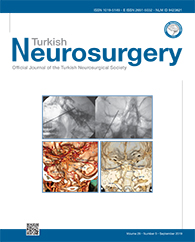2Department of Oral and Maxillofacial Pathology, School of Dentistry, Shiraz University of Medical Sciences, Shiraz, Iran DOI : 10.5137/1019-5149.JTN.25821-19.2 AIM: To assay the effects of simvastatin and L-carnitine on peripheral nerve repair.
MATERIAL and METHODS: Left sciatic nerve of 70 female rats were cut and repaired under aseptic microsurgery. Based on medications and treatment period, seven groups were formed; control: no medication, SIM1W: one week daily oral simvastatin, LC1W: one week daily oral L-carnitine, Plb1W: one week daily oral placebo, SIM1M: one month daily oral simvastatin, LC1M: one month daily oral L-carnitine, Plb1M: one month daily oral placebo. Following 90 days, behavioral assessments and then histopathology were done.
RESULTS: Mean reflex time of withdrawal reflex latency and toe out angle in all experimented groups increased than normal. Long-term drug-medication significantly improved toe out angle. In long-term drug-medication, inflammation and neural bundle differentiation were significantly lower and higher, respectively. Vascular index showed reduction but number of myelinated nerve fibers had rises in drug-medicated groups compared to control and placebo groups. No obvious differences were detected in myeline diameter.
CONCLUSION: Both Simvastatin and L-carnitine can accelerate and improve the process of nerve regeneration in a long enough treatment period. The regulatory influence of these exogenous neurotrophic drugs may be essential to optimize regeneration of nerve fibers; so can broaden horizons for novel therapeutic modalities to decrease neuronal apoptosis.
Keywords : Immune-modulation, L-Carnitine, Neurogenesis, Neuro-protection, Simvastatin, Rat




